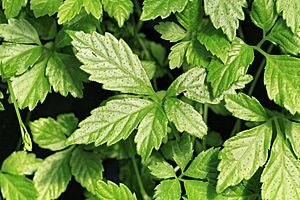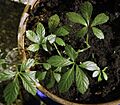Jiaogulan facts for kids
Quick facts for kids Jiaogulan |
|
|---|---|
 |
|
| Scientific classification |
|
| Kingdom: | Plantae |
| Clade: | Tracheophytes |
| Clade: | Angiosperms |
| Clade: | Eudicots |
| Clade: | Rosids |
| Order: | Cucurbitales |
| Family: | Cucurbitaceae |
| Genus: | Gynostemma |
| Species: |
G. pentaphyllum
|
| Binomial name | |
| Gynostemma pentaphyllum (Thunb.) Makino 1902
|
|
| Script error: The function "autoWithCaption" does not exist. | |
Script error: No such module "Check for conflicting parameters".
Gynostemma pentaphyllum, often called jiaogulan (Chinese: 绞股蓝, meaning "twisting blue plant"), is a cool climbing plant. It's found in many parts of South and East Asia, and also in New Guinea. This plant is part of the Cucurbitaceae family, which includes cucumbers and gourds. People have recently started using jiaogulan in traditional medicine.
Contents
What is Jiaogulan?
Jiaogulan has many common names. Some people call it "five-leaf ginseng" or "poor man's ginseng." Other names include "miracle grass," "fairy herb," and "sweet tea vine."
This plant belongs to the Gynostemma group. It's in the same family as cucumbers, gourds, and melons. Jiaogulan grows as a climbing vine. It uses special curly parts called tendrils to attach itself to things.
Leaves and Flowers
The leaves of jiaogulan usually have five smaller parts, like fingers on a hand. This is why its scientific name includes pentaphyllum, which means "five leaves." Sometimes, the leaves can have three or seven parts.
Each jiaogulan plant is either male or female. This means you need both a male and a female plant if you want to grow seeds. Its fruit is a small, purple gourd that you can't eat.
History of Jiaogulan
People in China have known about jiaogulan for a very long time. The plant was first written about in 1406. At that time, it was seen as a plant to eat when food was scarce.
Later, around 1578, a herbalist named Li Shizhen wrote about jiaogulan. He described its use for treating different health problems. These included swelling and injuries.
Modern Discoveries
Outside of China, people started noticing jiaogulan more in the 1970s. Researchers were looking for new sugar substitutes. A Japanese scientist found special compounds in jiaogulan. These compounds were similar to those found in ginseng, another famous herb.
These special compounds in jiaogulan are called gypenosides. Ginseng has similar compounds called ginsenosides. This discovery made jiaogulan even more interesting to scientists.
Where Jiaogulan Grows
Jiaogulan is one of about 17 types of plants in the Gynostemma group. Nine of these types are found only in China. However, jiaogulan itself grows in many places. You can find it from India and Bangladesh to Southeast Asia. It also grows in Japan, Korea, and New Guinea.
In China, jiaogulan likes to grow on mountain slopes. It can be found in forests, thick bushes, and along roadsides. It grows at different heights, from about 300 to 3200 meters above sea level.
Growing Conditions
Jiaogulan is a tough vine that can grow in many places. It can live for several years in warmer areas. In colder places, people often grow it as an annual plant. This means it lives for one growing season.
It grows best in soil that drains water well. It also needs plenty of sunshine. Jiaogulan does not like very cold weather. It won't grow well if temperatures drop below freezing.
Jiaogulan's Special Compounds
Jiaogulan contains many natural substances. These include sterols, saponins, and flavonoids. Scientists have taken out special compounds called gypenosides from its leaves.
Some of these gypenoside compounds are the same as those found in ginseng roots. This is why jiaogulan is sometimes called "southern ginseng." Scientists are still studying these compounds. More research is needed to fully understand how they affect people.
Uses of Jiaogulan
People often use jiaogulan in traditional medicine. It's commonly made into an herbal tea. You can also find it as a liquid extract or in dietary supplements.
For a long time, jiaogulan was not widely used in traditional Chinese medicine (TCM). This was because it grew far from central China, where TCM developed. So, it wasn't part of the main TCM books.
"Immortality Herb"
Before it became more known, jiaogulan was a local herb. People in mountainous parts of southern China and northern Vietnam used it. Local people sometimes call it the "immortality herb." This is because many older people in one area of China said they drank it regularly.
Research on Jiaogulan
Scientists have done some studies on jiaogulan. They have looked into its possible effects on things like heart health. They also studied its effects on high cholesterol or certain types of diabetes.
However, these studies are still very early. More research is needed to know for sure if jiaogulan is helpful for these conditions. Some small studies have also looked at whether it can help with feeling worried. But these results were not strong enough to draw clear conclusions.
Images for kids
See also
 In Spanish: Yiaogulan para niños
In Spanish: Yiaogulan para niños
 | Audre Lorde |
 | John Berry Meachum |
 | Ferdinand Lee Barnett |



